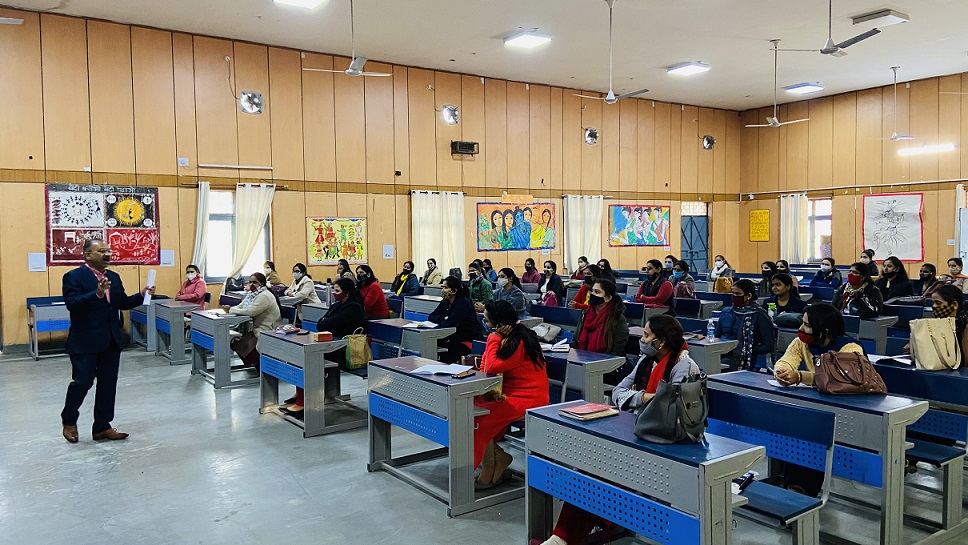Navigating the pandemic: Protecting livelihoods and continuing communication
Hello Rajiv, could you briefly introduce yourself?
Sure! I am Rajiv Sharma. Ten years ago, I quit a successful corporate career to found a social enterprise to help underprivileged youths. My company Empower Pragati, which offers vocational skills training to these youths, has skilled 450,000 trainees so far. This year we clocked $10 million in revenues.
The focus of our magazine is on the mindset of the inclusive business leader. Do you think that leaders are culture setters for their organizations?
You're absolutely right. If you want something to happen, you first need to adopt it yourself and show that you are capable of doing it. There has to be a culture of openness and trust for that. I believe in absolute brutal transparency in the organization. This fosters a learning mindset. At Empower Pragati, people do not get respect because of the chair they sit in, but because of the difference they make. And for that it is important to make the effort and to learn from others. As a leader even I cannot make a difference at every point. Many times, I need to go back down and say, "Sorry, I do not know. Will you teach me?"
What soft skills do you think leaders need to successfully build an inclusive business?
When I interview people in leadership roles, I say they must relate to our cause. If this is just another job for them, they may not succeed. But if they feel that transforming lives is the mission of their life, then perhaps money will follow. So, the ability to align with the purpose of the organization is important.
I also feel that, as an inclusive business leader, you should have patience. You should be a good listener, you should have respect for people, you must care for people's dignity. Don’t ever publicly say things which you would not like to hear about yourself.
What kind of skills do you think are necessary during the pandemic and in the post Covid-19 world?
The learning we had was to make best use of a crisis and opportunity. For our work, digital skills and the use of technology for training came in most useful. If you handle technology well, you can be much more productive. Doing meetings online, for instance, we save a lot of time that was otherwise spent travelling. Also, time and location have become irrelevant. The best teachers, say in Delhi, may not like to go to smaller towns. Online, they can simultaneously teach 300 students sitting in different locations. As a result, even in 2020, in spite of the lockdown, we could quickly adapt and resume training. As a result, our balance sheet was nicely in the green.
Another issue is people engagement. When the lockdown happened, people in the larger cities lost their jobs and started moving back to their villages on foot. They were under so much stress and needed a good emotional talk. So, in our outreach center, we picked up the trainee data we had and called these people. We connected with about 10,000 students and their family members. We couldn't do much, because of the lockdown and the distance. But the mere talking for 15 minutes gave them such comfort.
How has mental health been addressed within Empower Pragati?
We have addressed mental health by protecting livelihoods and continuing communication with our staff. I personally had about a dozen rounds of online communication with 300 people on each call. I felt strongly that I needed to continue talking, as I had access to knowledge which the people at the grassroots level might lack. So, I continued telling them that this virus could be addressed, and that their jobs were protected. And we did not lay off a single employee even though we did not have a job for so many of them during the long, extended lockdown. We did some salary cuts for 2 months. But we knew people might get anxious and stressed out, so we did extensive communication and consultations first with all staff.
One of my directors, Pritha Dutt, has been a professional counselor for suicide cases, mental health cases, and domestic disharmony. So, she helped create the process for addressing issues relating to this. I'm not professionally trained, but I still love if people call me up to talk about their problems.

© Empower Pragati
How do you think inclusive leaders in general can best address mental health issues?
Inclusive leaders should be as concerned for their larger audiences as they are for themselves and their families. It is not correct to discriminate between different sets of people. If I hear that one of my employees is not well, I pick up the phone and call that person. Whenever we hire a person, we welcome them to the Empower family.
How can empathetic, innovative business leaders use their skills to partner with communities or governments to develop new solutions to systemic challenges?
They need to collaborate instead of competing. My purpose in life is to give back to society. In India, this is a large job: 43 per cent of the population are below the poverty line. You need to collaborate to make a difference to such a large community. So, whenever I invent something, I share it with other business leaders.
I am also on most of the committees on vocational skill training. There, I represent the voice of the beneficiary, the student. As president of the Alliance of Skill Training Providers, I get first-hand grassroots information. I bring this data to the government, along with practical examples of how their policies work on the ground. On this basis, I can come up with recommendations on how to modify these policies. So, gathering, analyzing, and presenting data is an important skill, along with telling stories and sharing personal experiences.
